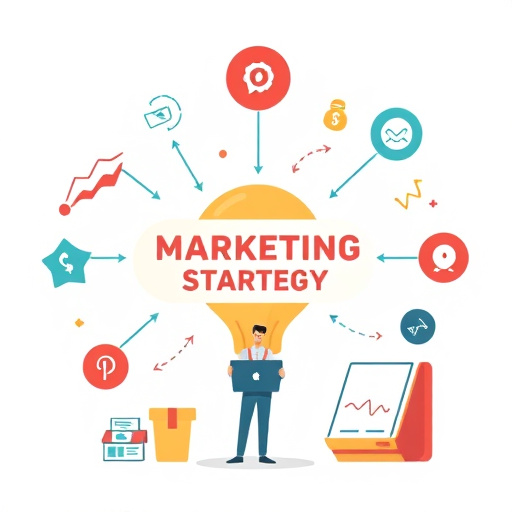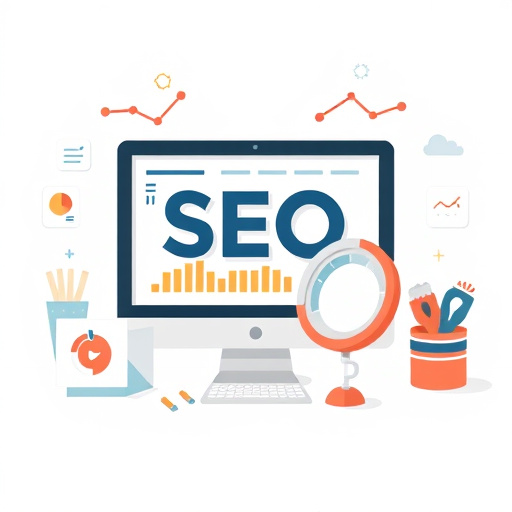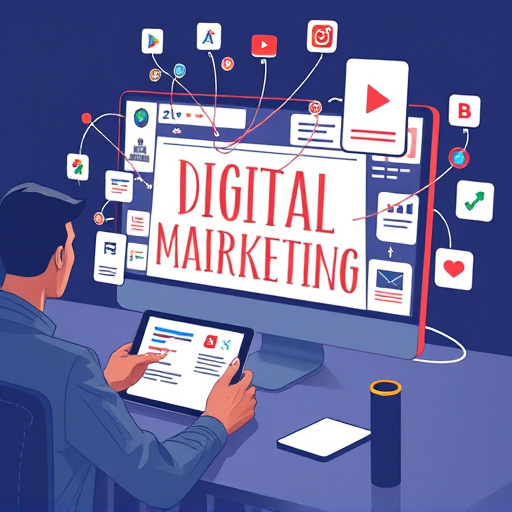E-commerce businesses can significantly boost sales through search engine marketing (SEM) by understanding customer search behavior and implementing tailored digital strategies. This includes optimizing websites for keywords, creating engaging ad campaigns, and utilizing paid advertising platforms to increase visibility and reach a wider audience. A well-designed website with mobile optimization, visual appeal, and SEO improves user experience, enhances Google rankings, drives traffic, and increases sales. To maximize online visibility, adopt local SEO, PPC advertising, social media campaigns, influencer partnerships, email marketing, and citation services. Measure success using KPIs like CTRs, CPC, conversion rates, and ROAS to track campaign effectiveness and adjust strategies for optimal results in competitive markets.
In today’s digital landscape, effective search engine marketing (SEM) is a game-changer for e-commerce businesses aiming to boost sales quickly. This article guides you through mastering SEM basics tailored for e-commerce success. We’ll explore strategic techniques to enhance visibility and drive instant conversions. Furthermore, we’ll delve into the measurement of key metrics to ensure optimal results. By understanding and implementing these strategies, your e-commerce venture is poised to navigate the digital realm successfully and achieve rapid sales growth.
- Understanding Search Engine Marketing Basics for E-Commerce
- Strategies to Increase Visibility and Drive Quick Sales
- Measuring Success: Tracking Key Metrics for Optimal Results
Understanding Search Engine Marketing Basics for E-Commerce

Search Engine Marketing (SEM) is a powerful tool for e-commerce businesses aiming to boost sales quickly. At its core, SEM involves understanding how potential customers use search engines and tailoring digital marketing strategies to capture their attention. By optimizing websites for relevant keywords, crafting compelling ad campaigns, and leveraging paid advertising platforms, e-commerce businesses can increase their visibility and reach a wider audience.
For e-commerce success in the competitive online landscape, a well-designed website is essential. Professional web design plays a crucial role in enhancing user experience, which directly impacts conversion rates. A Dallas-based web design expert can create or revamp an e-commerce site to ensure it’s mobile-friendly, visually appealing, and optimized for search engines—all factors that contribute to improved Google search rankings. This strategy not only drives more traffic but also increases the likelihood of customers making purchases, thereby quickly boosting sales figures.
Strategies to Increase Visibility and Drive Quick Sales

To increase visibility and drive quick sales through search engine marketing, e-commerce businesses should focus on a multi-faceted strategy. Start by optimizing your website for search engines using relevant keywords and high-quality content. This ensures your target audience finds you when searching for products or services related to your offerings. Additionally, leveraging local SEO in Frisco can attract nearby customers looking for locally-based solutions, boosting your online presence in a specific geographic area.
Implementing effective digital marketing strategies is another crucial step. Utilize pay-per-click (PPC) advertising campaigns to gain immediate exposure and drive targeted traffic to your e-commerce site. Targeted social media marketing can also be powerful, allowing you to connect with potential customers on their favorite platforms. Furthermore, consider the power of influencer partnerships and email marketing to nurture leads and convert them into loyal customers, all while enhancing your brand’s reputation in the digital space. Incorporating local citation services can also improve your search rankings locally, making it easier for nearby consumers to discover your business online.
Measuring Success: Tracking Key Metrics for Optimal Results

Measuring success is a pivotal aspect of search engine marketing (SEM), allowing businesses to understand their strategies’ effectiveness and make data-driven adjustments. Key performance indicators (KPIs) such as click-through rates (CTRs), cost per click (CPC), conversion rates, and return on ad spend (ROAS) are essential metrics to track. High CTRs indicate relevant ads that resonate with the target audience, while low CPC suggests efficient campaigns that don’t break the bank. Conversion rates give a clear picture of how well the marketing efforts translate into sales or desired actions.
For optimal results, especially in competitive markets like Dallas (where top-tier SEO services are in demand) or across diverse digital marketing landscapes in Broward, regular monitoring and analysis of these metrics are crucial. Tools provided by search engines and specialized analytics platforms can help businesses gain insights, identify trends, and optimize their SEM campaigns. By staying agile and responsive to data, e-commerce businesses can quickly boost sales and maintain a competitive edge in the ever-evolving digital marketing landscape.
Search Engine Marketing (SEM) is a powerful tool for e-commerce businesses aiming to boost sales quickly. By understanding the basics and implementing effective strategies, retailers can enhance their online visibility and attract more relevant customers. Measuring key metrics allows for continuous optimization, ensuring every click and investment contributes to increased revenue. With SEM, e-commerce enterprises can navigate the digital landscape, outperforming competitors and achieving remarkable sales growth in a matter of weeks.














